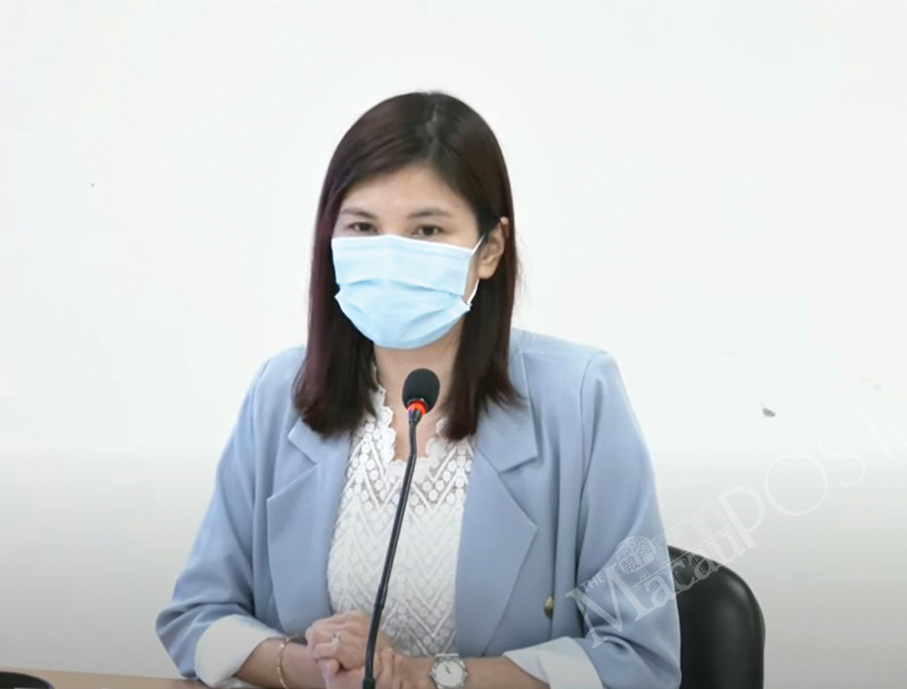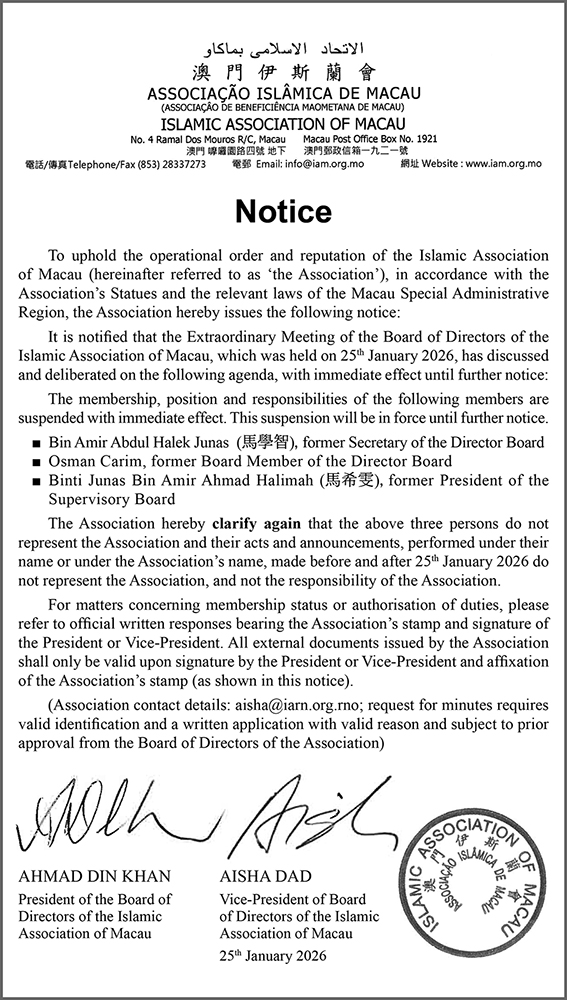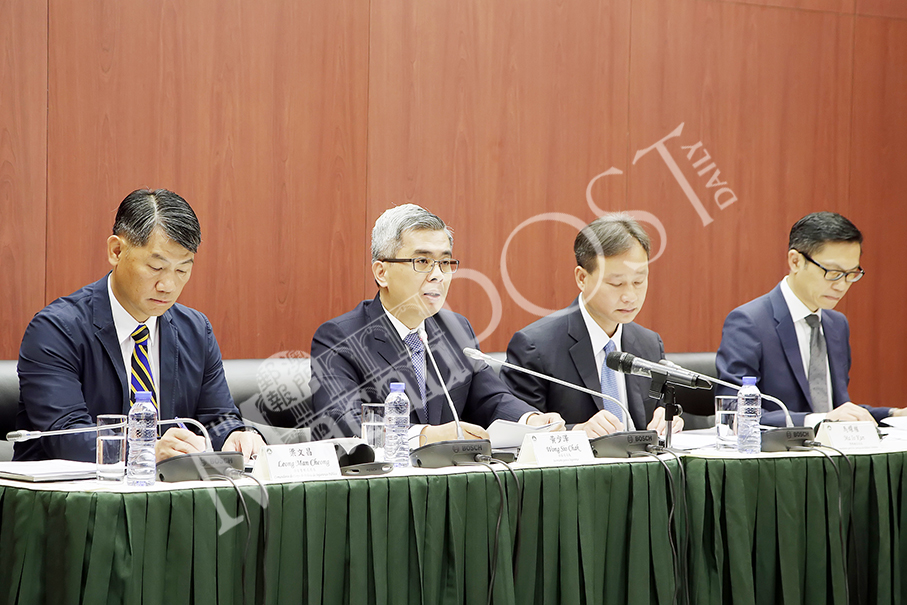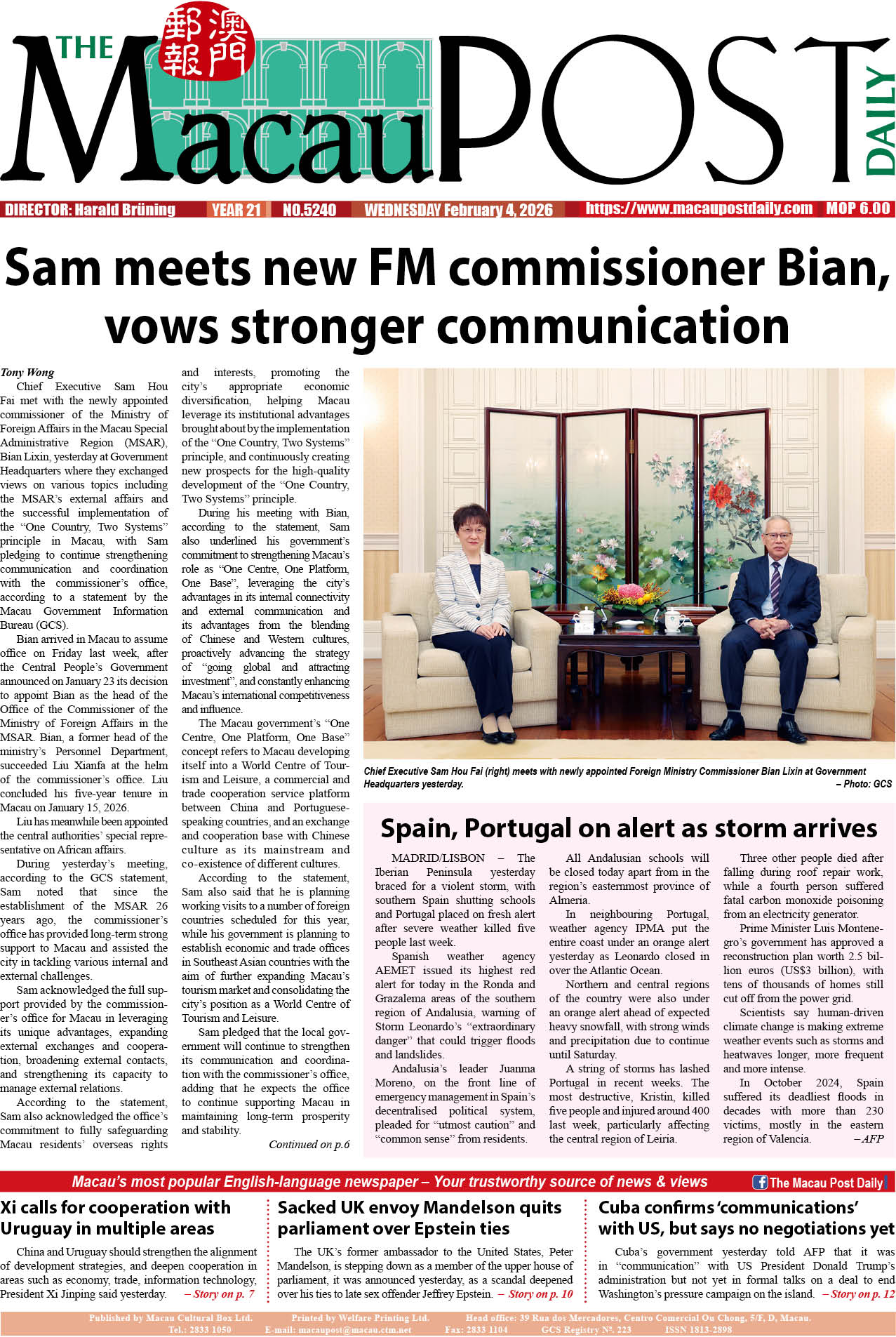The Health Bureau (SSM) said yesterday that while the free tests for those with a high COVID-19 risk covered by the government’s regular mandatory nucleic acid testing (NAT) programme will continue to be paid by the government, the free tests for those who are covered by the programme but entail a relatively lower COVID-19 risk are to be paid by their respective employers.
The bureau also underlined that those working in COVID-19-risk key occupations need to undergo regular nucleic acid tests because of their specific situation they entail a higher risk getting infected with COVID-19 compared to the general population.
Wong Weng Man, acting chief of the Health Promotion Division of the Health Bureau, made the remarks during yesterday’s weekly press conference by the Novel Coronavirus Response and Coordination Centre.
Wong also said that employers should not request their workers covered by the government’s regular NAT programme to undergo their tests always before they come to work. Instead, she said, employers are only required to ensure that their staff members always undergo their nucleic acid tests in compliance with the officially required frequencies.
Since Macau returned to its normalised COVID-19 prevention and control period early last week, the Health Bureau has added more occupations and professions to its COVID-19-risk key occupations that are subject to regular mandatory nucleic acid tests than before June 18, when Macau’s latest COVID-19 outbreak began.
The latest COVID-19 outbreak, Macau’s worst since the start of the pandemic, is also known in Chinese as “618 outbreak”, which started to subside around a month ago. “618” refers to the fact that the outbreak started on June 18.
After gaining relevant experiences from its then battle against the 618 outbreak, the Health Bureau had regularly reviewed its regular mandatory NAT programme for COVID-19-risk key occupations for normalised novel coronavirus period, before deciding early this month to add more occupations and professions to the programme and amend the testing frequencies of various occupations and professions. Early this month, the Health Bureau elaborated on its amendments to its regular mandatory NAT programme for those working in key occupations and professions that are potentially subject to a higher risk of getting infected with COVID-19, which took effect early last week.
Why govt extends coverage of regular mandatory tests
According to the bureau’s announcements early this month, the government lists two major groups of occupations and professions in its regular mandatory NAT programme. The first group is those who entail a higher risk of getting infected with COVID-19, such as those whose jobs require them to be in contact with people or items arriving from COVID-19-affected countries and regions, while the second group is those whose possible COVID-19 infection is very likely to result in an outbreak, such as prison staff and those working in day nurseries.
The bureau’s announcements early this month said that the 618 outbreak enabled the government to realise that cleaning staff and security staff possible COVID-19 infection is very likely to result in a massive community outbreak, because of which it had decided to add cleaning staff and security staff working for certain indoor venues in its regular NAT programme. Before June 18, cleaning staff and security staff were not covered by the government’s regular NAT programme.
The bureau’s announcements early this month also said that the government had also decided to add public bus, school bus and coach drivers, who were not covered by its regular NAT programme before June 18, to the amended version of the programme, which took effect early last week, after considering that they run a higher risk of getting infected with COVID-19.
Details in English on the list of occupations and professions covered by the latest version of the guidelines on the government’s regular mandatory NAT programme can be checked at: https://www.ssm.gov.mo/docs2/file/pv/vAolsrjVE1PlYriUE8VYQ/en
According to the guidelines, around four dozen occupations and professions are covered by the government’s regular mandatory NAT programme. They are subject to different testing frequencies depending on their respective COVID-19 risks, ranging from a test every day (highest risk) to every seven days (lowest risk).
During yesterday’s press conference, Wong underlined that all employees covered by the government’s regular mandatory NAT programme do not need to pay for their tests. However, Wong said that while the government will pay for nucleic acid tests undergone by those with a high COVID-19 risk, the tests undergone by those with a relatively lower risk will have to be paid by their respective employers.
Wong also said that employees covered by the government’s regular mandatory NAT programme do not necessarily undergo their tests in Macau, adding that they can undergo their tests elsewhere as long as the test results are also displayed on the Macau Health Code. In Macau, each paid COVID-19 nucleic acid test costs 50 patacas.
Quarantine hotel staff possibly infected by guest
Meanwhile, Wong also revealed during yesterday’s press conference that for the time being the Health Bureau does not rule out the possibility that a staff member of Treasure Hotel in Taipa, whose COVID-19 positive case was announced on Monday, had been infected by a person undergoing medical observation in the hotel, which is one of the government’s quarantine hotels.
According to Monday’s announcement, the employee, a 24-year-old male non-resident worker (NRW) subject to “closed-loop management”, tested positive for COVID-19 earlier that day.
Wong said yesterday that the staff member was tasked with delivering meals and other items to room guests and collecting rubbish. Wong noted that Treasure Hotel, which is located opposite the airport, is used as a special quarantine hotel earmarked for those arriving from China’s Taiwan region and foreign countries, adding that a higher percentage of those arriving from Taiwan and foreign countries over the past two weeks had been diagnosed with COVID-19 infection compared to one or two months ago, because of which, she said, the Health Bureau does not rule out the possibility of the staff member having been infected by a room guest while working.
Wong also noted that currently quarantine hotel staff members working in high-risk positions are required to undergo a nucleic acid test every other day, adding that after Monday’s detection of the COVID-19 case at Treasure Hotel, the government has required Treasure Hotel’s staff members working in high-risk positions to undergo a test every day.
According to the Health Bureau’s guidelines, quarantine hotel staff members working in lower-risk positions are undergo a nucleic acid test every seven days.
Wong also said that as of yesterday afternoon no any other Treasure Hotel staff members subject to “closed-loop management” had been diagnosed with COVID-19 infection.
Meanwhile, Wong also said that some people undergoing hotel quarantine had told the Health Bureau that they felt unwell when they had their nasopharyngeal swabs taken for COVID-19 tests while undergoing medical observation as the health workers inserted the swabs “too deeply” into their nose. Wong noted that as those undergoing hotel quarantine face a higher risk of having been infected with COVID-19 compared to the general population, it is necessary for health workers to take their swabs in a more rigorous way compared to when they take swabs from people in general.

Wong Weng Man, acting chief of the Health Bureau’s (SSM) Health Promotion Division, addresses yesterday’s press conference about the city’s COVID-19 situation. – Photo: GCS








